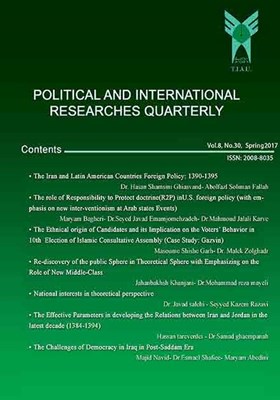Re-discovery of the public Sphere in Theoretical Sphere with Emphasizing on the Role of New Middle-Class
Subject Areas : Political and International Researches Quarterly
Keywords: Public Sphere, democracy, enlightenment, Deliberative Democracy,
Abstract :
For the philosophers of the Enlightenment, the idea of reason was inextricably tied to publicity and public argument. Reason is public in the sense that it does not recognize any authority other than the better argument, and its public use must be free to bring about a process of enlightenment. The "public sphere" was understood as a sphere for critical discourse, placing all established powers and truths on the tribunal of reason. More than any other philosopher, Kant emphasized the internal connection between reason and publicity. The German philosopher, Hegel, and British thinker, Stewart Mill also had reservations about the growing political role of public sphere. During the first decades of the twentieth century, democracy was introduced in most European countries. An important prerequisite for this was the establishment of public sphere. Well into the interwar period, the political left and the conservative elite shared a skeptical view of democracy. The question of democracy and public sphere therefore remained central to the Cold War era. The idea of the public sphere was rediscovered and elaborated in such new, socially critical atmosphere. In this environment, the role of middle-class also has been noticed along with the necessity of public sphere development for realization and deepening of democracy as well as political development. This paper is an historical and theoretical overview of the discovery and re-discovery of the public sphere with emphasizing of the middle class role in developing public sphere.
_||_

